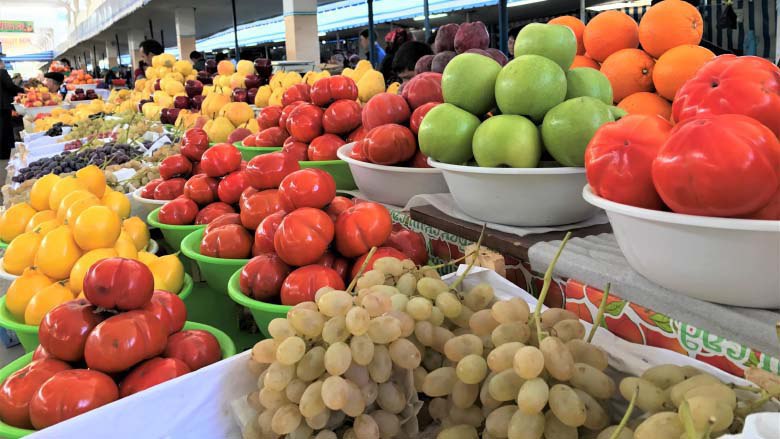Uzbekistan balances growth in fruit exports with soaring imports
Over the past three years, Uzbekistan’s fruit imports have increased more than fourfold. According to EastFruit, this sharp rise is largely due to the elimination of import duties, which has made exotic fruits such as bananas, mandarins, and dried persimmons more accessible and popular on Uzbek tables. Of particular note is the dramatic surge in apple imports, which have grown 17-fold during this period.

Despite being one of the region’s major fruit exporters, Uzbekistan is rapidly becoming an attractive market for fruit-exporting countries. The EastFruit portal has highlighted the sharp growth in Uzbekistan’s fruit imports.
“While Uzbekistan’s fruit exports continue to flourish, its imports are surging at a pace that’s rewriting the narrative. This isn’t just a minor shift; it’s a transformation that’s both surprising and significant,” the analysis states.
Between 2021 and 2024, Uzbekistan’s fruit exports rose by 93%, from $341 million to $658 million. Growth has been especially strong in traditional categories such as grapes, dried fruits, and apricots, which enjoy strong demand in international markets. Cherry exports, in particular, stand out: export revenue from cherries increased from $20 million to $50 million – a 150% jump.
Interestingly, during the same period, fruit imports grew from $60 million to $250 million – a staggering 317% increase, ranking among the fastest growth rates in the world.
While exports nearly doubled, imports grew more than fourfold, driven by strong demand for bananas, citrus fruits (especially mandarins and oranges), and fresh apples.
Surprisingly, the fastest-growing import wasn’t an exotic fruit – it was the apple. Apple imports skyrocketed 17-fold in just three years, surpassing $85 million in 2024. Banana imports also tripled, exceeding $100 million for the first time. Mandarin imports grew even faster, quadrupling in three years to reach $95 million in 2024 – nearly equaling banana import volumes.
Other fast-growing import categories included oranges (a fivefold increase to $25 million), as well as pears, kiwis, and persimmons.
According to EastFruit, a trade mission organized in Uzbekistan for Egyptian and Moroccan exporters – supported by the UN Food and Agriculture Organization (FAO) and the European Bank for Reconstruction and Development – is already showing positive results.
Why has demand for fruit imports surged?
Analysts point to several factors driving this unexpected rise in imports. Uzbek consumers are increasingly seeking exotic fruits like bananas and citrus – a trend reflecting both global consumption patterns and rising household incomes in Uzbekistan.
“Year-round consumption of fresh fruits is gradually displacing seasonal consumption and becoming the norm in Uzbekistan. This growth is occurring at the expense of dried fruits, which traditionally replaced fresh produce for local consumers during the winter period. And this, in turn, contributes to the growth of dried fruit exports,” says Andriy Yarmak, economist at the FAO Investment Centre.
This rapid growth is also closely tied to government policy: the Uzbek government eliminated import duties on fruit. Although this exemption is officially temporary, it has been repeatedly extended over the past few years.
What does this mean for traders, farmers, and consumers?
This isn’t just a matter of statistics – it’s a game-changing shift, EastFruit writes.
For those involved in fruit trade, Uzbekistan’s $250 million fruit import market presents a golden opportunity. Suppliers of bananas, apples, persimmons, and citrus fruits – from countries such as Egypt, Pakistan, Morocco, Poland, and Ukraine – are already capitalizing on this opportunity. Still, the market holds untapped potential. The key challenge lies in managing logistics and competition, while the main opportunity is the market’s rapid growth.
“Markets once filled solely with local harvests now brim with global flavors — a sign of a nation opening up and getting wealthier,” the publication notes.
At the same time, Uzbekistan is solidifying its leading position in exports – the $658 million figure for 2024 is evidence of that. However, with imports reaching $250 million and rising rapidly, the balance appears to be shifting. One thing is clear: Uzbekistan’s fruit trade is no longer defined solely by its famous orchards. Trade brings prosperity – and both exports and imports are creating new opportunities for entrepreneurs and consumers alike.
Related News

16:58 / 24.07.2025
Uzbekistan boosts electricity exports amid ongoing outages

23:02 / 23.07.2025
Uzbekistan’s foreign trade turnover hits $37 billion in first half of 2025

16:01 / 23.07.2025
iPhone prices spike in Uzbekistan amid new customs limits

14:47 / 23.07.2025



